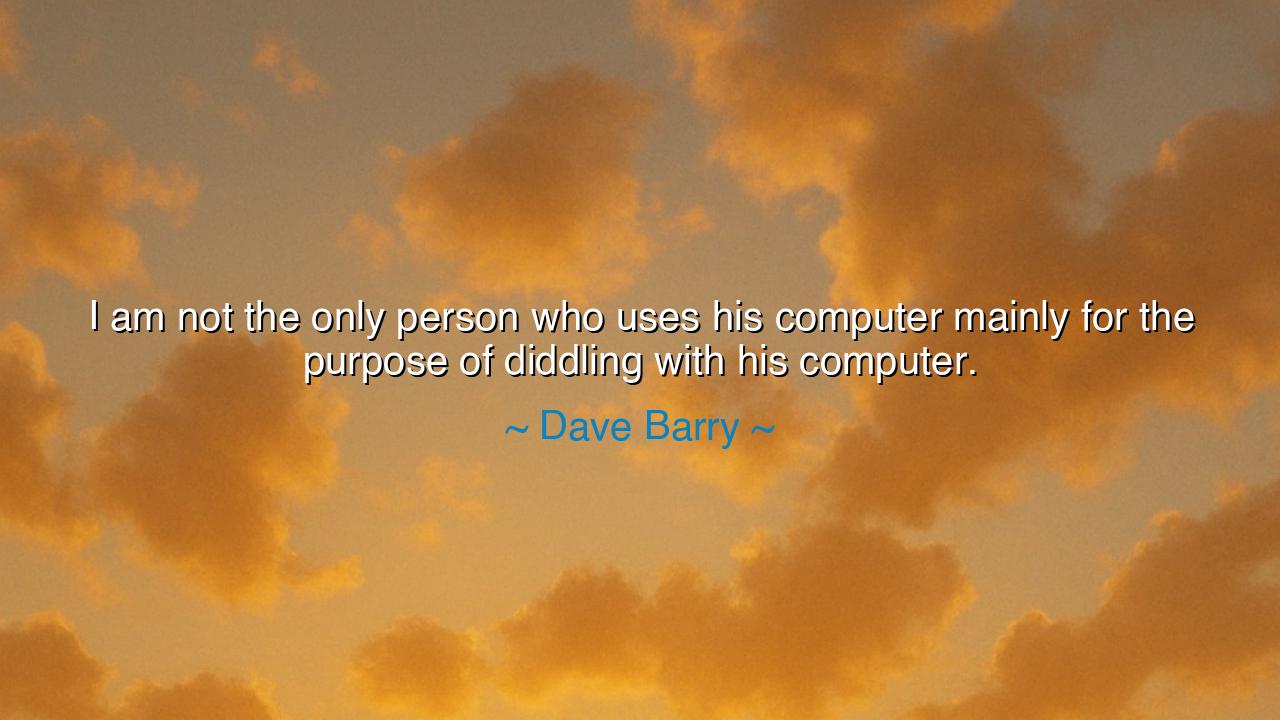
I am not the only person who uses his computer mainly for the
I am not the only person who uses his computer mainly for the purpose of diddling with his computer.






In the grand sweep of human progress, there lies a truth that has been both illuminating and, at times, amusing: that the tools we create, for all their grandeur and utility, are often used for purposes far removed from their original intent. Dave Barry, in his playful yet insightful observation, "I am not the only person who uses his computer mainly for the purpose of diddling with his computer," speaks to this truth with humor and a touch of self-deprecation. His words reflect a reality we all know too well: the very tools we have crafted to revolutionize our lives often become, in the end, distractions and toys. It is in this diddling, this playful engagement with our creations, that we uncover a deeper, more philosophical truth about the nature of technology and its impact on our lives.
The ancients recognized this duality in the tools they created. The great Greek philosopher Plato often spoke of how human beings, when presented with powerful new tools or knowledge, could easily become distracted from their higher purpose. In his famous work, The Republic, he warned that the human soul could be seduced by the material world and its distractions, leading us to lose sight of wisdom and truth. The creation of the computer, while a marvel of human intellect, is no different. It is not enough to create powerful tools; we must remain vigilant in how we choose to use them. The diddling Barry mentions is a reflection of how human nature often gravitates toward the simplest forms of pleasure and entertainment, even when greater potential lies within reach.
Consider the story of Archimedes, the great inventor and mathematician of ancient Greece. While his work in geometry and mechanics has shaped the course of history, there are also tales of Archimedes losing himself in the simple pleasures of invention and exploration, as when he was lost in thought while playing with the properties of water. His famous exclamation, "Eureka!" was born not from a grand invention, but from a playful experiment with the displacement of water. In many ways, this reflects Barry’s idea that we can get lost in the joy of exploration—the act of diddling with our creations can sometimes become as important as their intended purpose.
In Renaissance Italy, Leonardo da Vinci, a man who straddled the line between art and science, created countless notebooks filled with designs and inventions. Many of his drawings, while brilliant, were simply musings, experiments in creativity, and doodling. Da Vinci's use of his tools often went beyond their practical function; he would explore and experiment in ways that were not bound by the constraints of utility. Similarly, today’s computer serves not just as a tool for productivity or information, but also as a canvas for exploration, entertainment, and sometimes, pure indulgence. Barry’s words are a reminder that, like da Vinci, we can embrace the process of exploration and creativity, even if it leads us to the occasional distraction.
The lesson that emerges from Barry’s quote is one of balance and awareness. The computer, like any tool, is a double-edged sword. It has the potential to elevate human thought, to revolutionize communication, and to bring about profound changes in society. But it also carries the risk of becoming a source of mindless diddling, pulling us away from our true goals and higher pursuits. The ancients understood that power comes not from the tools we use, but from how we use them. They knew that wisdom comes not from the endless distractions that technology can provide, but from the focused, purposeful engagement with the world around us. Barry’s words remind us to be mindful of the time we spend on these devices, ensuring that we do not lose ourselves in the trivial and the fleeting.
In practical terms, this means we must engage with our technology intentionally. Diddling with our computers is not inherently bad, for in play and exploration, we find creativity and joy. But we must also recognize when it is time to focus, to harness the power of our tools for greater purposes. Just as Leonardo da Vinci used his creativity to solve real-world problems, so too should we strive to use our devices to enhance our lives, to learn, create, and connect with the world in meaningful ways. The danger lies not in the act of diddling itself, but in letting it become the dominant force, taking us away from our greater aspirations.
Barry’s statement is ultimately a reflection of the human condition—we create tools to elevate us, but sometimes, those tools become our masters. The challenge, then, is not to reject technology, but to use it wisely, with intention and self-awareness. Let us embrace the playful side of our tools, but let us also recognize that the true potential of our computers lies not in idle distractions, but in their ability to connect us, to inspire us, and to help us achieve things greater than ourselves. Through this balance, we will not only explore new worlds but also build meaningful connections that will shape the future for generations to come.






AAdministratorAdministrator
Welcome, honored guests. Please leave a comment, we will respond soon